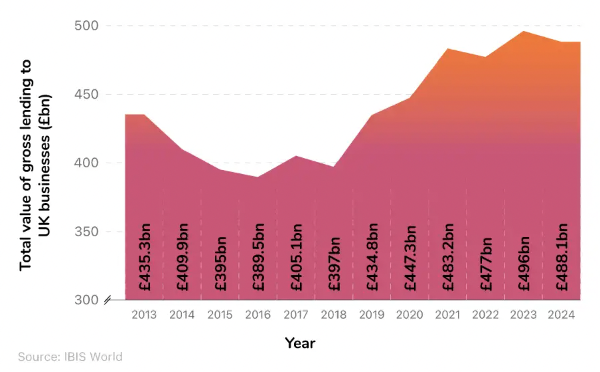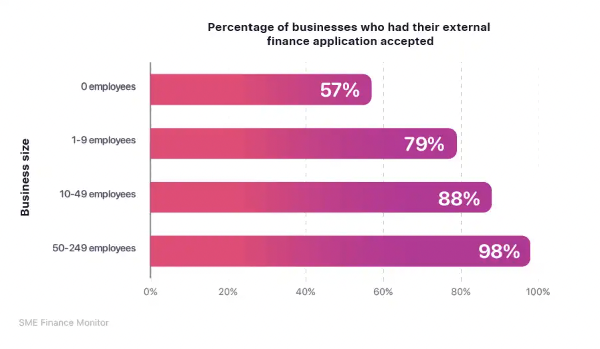Business Loans For UK Companies: How Do They Work?

Finding the right support to grow your UK company can be tough. One fact stands out: business loans offer a lifeline to many firms. This post will explain how business loans work, highlighting their benefits and pitfalls.
Keep reading for insights on securing that much-needed cash injection.
Key Takeaways
- Business loans provide essential funding for UK companies to invest in growth, manage cash flow, or cover operational expenses. They come in various forms, including secured and unsecured loans, with specific options like term loans and revolving credit facilities catering to different needs.
- To qualify for a business loan, lenders assess a company's credit history, financial statements, and business plan. This evaluation helps them determine the borrower’s ability to repay the loan on time. A strong application increases the likelihood of securing funding.
- While business loans offer benefits such as access to capital and potential tax advantages, they also carry risks like high interest rates and increased debt burdens. Companies must carefully consider their repayment capabilities before taking on a loan.
- The application process involves filling out detailed forms and providing necessary documentation such as financial statements and proof of identity. Successful applications are backed by solid business plans outlining strategies for growth and profitability.
- Comparing offers from multiple lenders is crucial when selecting a business loan. Interest rates, repayment terms, and associated fees vary widely among providers; hence comparing these factors can help businesses secure the most suitable deal for their situation.
Understanding Business Loans
Getting to grips with business loans is crucial for UK companies aiming to expand or manage their finances. They provide a vital source of funding but come in different forms, each with its own set of rules and benefits.
Definition and purpose of a business loan
A business loan is money a company borrows from a bank or building society to invest in growth, expansion, or day-to-day operations. Companies use these funds for various needs, such as buying inventory, covering operating expenses, or purchasing new equipment.
This financing option supports UK firms aiming to start up or scale their activities effectively.
The purpose behind securing a business loan includes setting up new ventures with start-up business grants UK offers or growing existing ones using the best business loans UK lenders provide.
It helps businesses manage cash flow better during tough times and finance expansions without depleting their savings. Whether it's small business loans in the UK government promotes for financial support, Natwest business loans for quick funding solutions, or leveraging a business loan calculator in the UK for planning repayments – each serves the fundamental goal of fostering entrepreneurial growth and sustainability.

Source: Money.co.uk
Types of business loans: secured and unsecured
Secured and unsecured loans represent the two primary categories of business loans available for UK firms. Secured loans depend on collateral, such as property or equipment, which lenders necessitate to support the borrowed amount.
This security enables businesses to potentially obtain larger sums at lesser interest rates as it reduces the lender's risk. Conversely, unsecured loans don't require any collateral.
They are solely dependent on a company's creditworthiness and typically result in elevated interest rates due to increased risk for the lender.
For small business owners desiring flexibility, unsecured loans might turn out to be more accessible since they remove the requirement for tangible assets as security. However, companies with considerable assets may be inclined towards secured options to take advantage of more favourable borrowing terms.
Whether choosing a government-supported scheme or exploring start-up business loans in the UK, grasping these basic loan structures is vital for making sound financial choices that are consistent with specific business requirements and objectives.
Additional loan types tailored to specific business needs
Businesses looking for finance options can explore term loans, which offer a lump sum of cash upfront. These are to be repaid over a set period. This type suits long-term investments well.
Another choice is revolving credit loans, similar to business credit cards but with typically higher limits and lower interest rates. They allow companies to borrow up to a specified limit whenever needed.
Government loans present an alternative, often featuring more favourable terms such as lower interest rates or longer repayment periods. Start-up business loans UK and small business loans UK government schemes are designed specifically to support new and small businesses in their early stages, providing the essential capital required for growth and development.
Qualification Criteria for Business Loans
Lenders scrutinise your credit history, financial statements, and business plan when you apply for a business loan. These elements help them judge if you can repay the borrowed money on time.
Examination of credit history, financial statements, and business plans
Banks and other lenders examine a company's credit history, financial statements, and business plans thoroughly before approving UK business loans for startups. This process checks the borrower's ability to repay the loan.
A good credit history shows that a company has managed its finances well in the past. Financial statements provide insight into the company’s current financial health, revealing income, expenses, and profitability.
Business plans demonstrate how the company intends to use the funding to grow and generate future income.
For start-up business loans in the UK, presenting a solid business plan is crucial. It should detail market research, projected earnings, and long-term goals. Lenders use this information to gauge potential risks and decide on the feasibility of granting a loan.
Therefore, companies must prepare these documents carefully to boost their chances of securing funding. This step is vital both for traditional bank loans and government-backed options available in the UK.

Source: Money.co.uk
Benefits and Disadvantages of Business Loans
Securing a business loan offers companies quick access to funds for expansion or covering operational costs. Yet, it also introduces the challenge of managing higher debts and the possibility of increased financial strain.
Access to capital, flexible repayment options, and tax benefits
Business loans provide UK companies with the crucial funds they need for various purposes. Businesses can use these funds to expand, buy new equipment, or manage cash flow. This capital is especially important for startups that might not have access to other financing options.
Business loan calculators in the UK help firms understand potential repayment amounts and terms before they apply.
Furthermore, business loans come with flexible repayment options. Companies can choose plans that match their income patterns, allowing them to manage their finances better without straining their cash flows.
In addition, there are potential tax benefits associated with business loans. Interest payments on these loans might be tax-deductible, reducing the overall cost of borrowing for businesses and providing some relief during financial reporting periods.
High interest rates, increased debt burden, and risk of defaulting
While securing a business loan provides companies with the much-needed capital to grow, it's crucial not to overlook the potential downsides. High interest rates can significantly increase the total amount that businesses must repay, making loans an expensive option.
For start-ups especially, where cash flow might already be tight, these costs can add up quickly and strain finances even further.
Moreover, taking on a loan increases a company's debt burden. This added financial pressure can lead to a higher risk of defaulting on the loan if sales don’t meet expectations or if unexpected expenses arise.
Given this risk, UK companies must carefully consider their ability to manage repayments before opting for start-up business loans or any government business loans available in the UK market.
Application Process for Business Loans
Applying for a business loan in the UK involves filling out an application form and rounding up all the required documents. Lenders will ask you to present your financial statements, proof of identity, and a solid business plan to start the assessment.
Completing a loan application form and providing necessary documentation
Filling out a loan application form is the first step in securing business start up loans in the UK. Applicants must include detailed financial statements, tax returns, and their business plans.
This paperwork paints a clear picture of the company's financial health and its potential for success. Lenders use this information to assess risk and decide on eligibility.
Providing essential documentation such as financial statements and tax returns helps lenders understand how well your business manages its finances. A solid business plan outlines your strategy for growth and profitability, showing lenders that you have a clear path to repaying the loan.
These steps are crucial for businesses looking to secure funding through UK business loans calculators or specific start up business loans in the UK pathways.
Advice for Choosing a Business Loan
When picking a business loan, make sure to compare offers from different lenders to find the best deal for your company. Explore more on this topic to ensure you choose wisely.
Comparing offers from multiple lenders
Comparing offers from multiple lenders is essential when choosing a business loan in the UK. Look at the interest rates, as they can vary significantly and affect your repayment amount.
Many start-up business loans in the UK come with different rates.
You should also review repayment terms. Some loans offer flexibility that might suit your business cash flow better than others. Lastly, evaluate any fees associated with the loan.
This process helps you find a deal that matches your financial situation and needs while using tools like a business loan calculator for accuracy in planning repayments.
Conclusion and Encouragement for Feedback
Exploring business loans in the UK reveals a path filled with opportunities for growth and expansion. Companies can thrive by making informed choices about their financing options.
It's clear that understanding both the benefits and risks sets the stage for successful borrowing. Let us know your thoughts or share your experiences with business loans. Your insights could guide others on their financial journey.
Related Posts
Ask the Expert
Mortgage Brokers


_7779.jpg)

